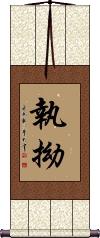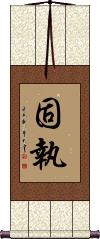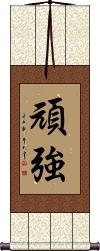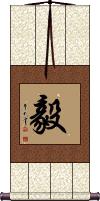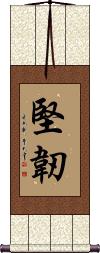Many custom options...
And formats...

Relentless Stubborn in Chinese / Japanese...
Buy a Relentless Stubborn calligraphy wall scroll here!
Personalize your custom “Relentless Stubborn” project by clicking the button next to your favorite “Relentless Stubborn” title below...
Relentless / Stubborn
執拗 means relentless or stubborn in Chinese, Japanese Kanji, and old Korean Hanja.
It can also be translated as willful, pigheaded, persistent, obstinate, tenacious, insistent, importunate, or persevering.
This is a rather negative word. it’s really inappropriate for a wall scroll, so please don’t order this unless you really want to shock Asian people who see it.
Persistence
固執 can also mean “opinionated” or “stubborn” in Chinese and Japanese, but in the nicest way possible (still bad).
This just means “stubborn” in Korean (not a good scroll if your audience is Korean, in fact, we don't recommend this word at all). There are better ways to express this idea, such as tenacity/tenacious or perseverance... ...see the links below...
See Also: Tenacious | Fortitude | Perseverance
Tenacious / Tenacity
頑強 means “Tenacious,” “Hard to Defeat,” or “Dogged.”
Alone, the first character means mischievous, obstinate, or stubborn. But it loses some of the mischievous meaning when the second character is added.
The second character means strength, force, power, or better.
See Also: Determination | Dedication | Devotion | Never Give Up
Perseverance
毅 is the simplest way to express perseverance in Chinese and Korean Hanja.
This single-character version leaves a bit of mystery about what kind of perseverance you might want to convey.
In Korean, this is usually associated with “strength of character.”
In Japanese, this character can be pronounced in a dozen different ways (so we have left out the Japanese pronunciation guide that normally appears above). In Japanese, this Kanji would usually be translated as “strong” (perhaps strong-willed).
Perseverance / Fortitude
Perseverance
堅韌不拔 is about perseverance, being steadfast and persistent.
堅韌不拔 is a great phrase for you if you commit to your goals and overcome obstacles, no matter how long it takes.
The translation of this proverb literally means “something so persistent or steadfast, that it is not uprootable, movable, or surpassable.”
Other translations include being firm and indomitable or tenacious and unyielding.
See Also: Tenacious | Devotion | Persistence | Indomitable
Perseverance / Indomitable / Invincible Fortitude
堅忍不抜 means determined, steadfast, unswerving, or unshakable in Japanese.
This is the Japanese version of an old Chinese 4-character perseverance proverb.
This would be understood in Chinese, but it's not commonly written this way in Chinese.
![]() Note that when writing this as Kanji, Japanese calligraphers sometimes write the second Kanji in the form shown to the right. Yes,
it’s
just one stroke that is slightly different in location, crossing another stroke in this alternate Japanese Kanji form. If you have a preference, let us know when you order.
Note that when writing this as Kanji, Japanese calligraphers sometimes write the second Kanji in the form shown to the right. Yes,
it’s
just one stroke that is slightly different in location, crossing another stroke in this alternate Japanese Kanji form. If you have a preference, let us know when you order.
Due to some odd computer coding conventions, these two character forms were combined/merged into the same code point - thus, you will not see Kanji images of more Japanese form as you select options for your scroll.
Not the results for Relentless Stubborn that you were looking for?
Below are some entries from our dictionary that may match your Relentless Stubborn search...
| Characters If shown, 2nd row is Simp. Chinese |
Pronunciation Romanization |
Simple Dictionary Definition |
執拗 执拗 see styles |
zhí niù zhi2 niu4 chih niu shitsuyou / shitsuyo しつよう shitsuou / shitsuo しつおう |
More info & calligraphy: Relentless / Stubborn(adjectival noun) persistent; obstinate; tenacious; relentless; insistent; importunate; persevering; stubborn |
執よう see styles |
shitsuyou / shitsuyo しつよう |
(adjectival noun) persistent; obstinate; tenacious; relentless; insistent; importunate; persevering; stubborn |
Variations: |
shitsuyou; shitsuou(執拗) / shitsuyo; shitsuo(執拗) しつよう; しつおう(執拗) |
(adjectival noun) persistent; obstinate; tenacious; relentless; insistent; importunate; persevering; stubborn |
The following table may be helpful for those studying Chinese or Japanese...
| Title | Characters | Romaji (Romanized Japanese) | Various forms of Romanized Chinese | |
| Relentless Stubborn | 執拗 执拗 | shitsu you / shitsuyou / shitsu yo | zhí niù / zhi2 niu4 / zhi niu / zhiniu | chih niu / chihniu |
| Persistence | 固執 固执 | koshuu / koshu | gù zhí / gu4 zhi2 / gu zhi / guzhi | ku chih / kuchih |
| Tenacious Tenacity | 頑強 顽强 | gan kyou / gankyou / gan kyo | wán qiáng wan2 qiang2 wan qiang wanqiang | wan ch`iang wanchiang wan chiang |
| Perseverance | 毅 | see note / seenote / se note | yì / yi4 / yi | i |
| Perseverance Fortitude | 堅韌 坚韧 | jiān rèn / jian1 ren4 / jian ren / jianren | chien jen / chienjen | |
| Perseverance | 堅韌不拔 坚韧不拔 | jiān rèn bù bá jian1 ren4 bu4 ba2 jian ren bu ba jianrenbuba | chien jen pu pa chienjenpupa |
|
| Perseverance Indomitable Invincible Fortitude | 堅忍不抜 / 堅忍不拔 坚忍不拔 | kenninfubatsu | jiān rěn bù bá jian1 ren3 bu4 ba2 jian ren bu ba jianrenbuba | chien jen pu pa chienjenpupa |
| In some entries above you will see that characters have different versions above and below a line. In these cases, the characters above the line are Traditional Chinese, while the ones below are Simplified Chinese. | ||||
Successful Chinese Character and Japanese Kanji calligraphy searches within the last few hours...
